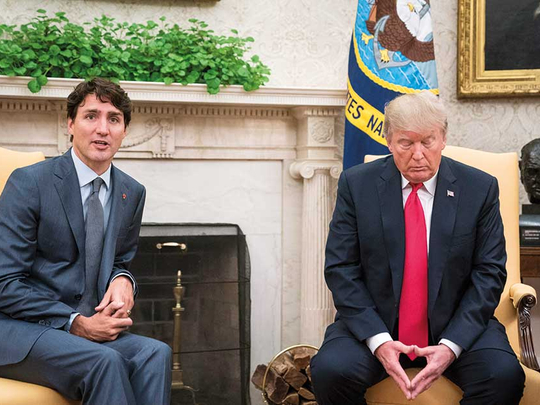
Madrid: They share the world’s longest unprotected border, have baseball, basketball and ice hockey teams that play together in professional leagues, and are allies in conflicts since the First World War. But right now, the United States and Canada are engaged in a war of words — and tweets — over trade.
But after President Donald Trump’s parting shots against Canadian Prime Minister Justin Trudeau on the day he left the Group of Seven summit meeting in Quebec, the country reacted with uncharacteristic outrage and defiance at a best friend’s nastiness.
“It was extremely undiplomatic and antagonistic,” Frank McKenna, a former Canadian ambassador to the United States, wrote in an email. “It was disrespectful and ill-informed. Friends do not treat friends with such contempt.”
Even Trudeau’s political foes rose to his defence. “We will stand shoulder to shoulder with the prime minister and the people of Canada,” Doug Ford, who was recently elected premier of Ontario, wrote on Twitter. Stephen Harper, the former Conservative prime minister whom Trudeau beat to become prime minister, told Fox News on Sunday that Trump had made a mistake targeting trade relations with Canada. “I can understand why President Trump, why the American people feel they need some better trade relationships,” he said. But, he added, “this is the wrong target.”
On Friday and Saturday, the G7 meeting hosted by Canada in a remote Quebec resort deteriorated into a nasty spat between Canada along with France, Germany, Italy, Japan and the United Kingdom against the protectionist policies of President Donald Trump. “Based on Justin’s false statements at his news conference, and the fact that Canada is charging massive tariffs to our US farmers, workers and companies, I have instructed our US Reps not to endorse the communiqué as we look at tariffs on automobiles flooding the US Market!” Trump tweeted. He then proceeded to blast Trudeau as “meek and mild” and “very dishonest and weak” in a barrage that was sparked by the prime minister’s comments that US tariffs on steel and aluminium were “insulting”.
As Canadians were recovering from the sting of those remarks, Trump’s economic adviser Larry Kudlow piled on, saying on television that Trudeau had “stabbed us in the back,” betrayed Trump and made him look weak before his summit meeting on Tuesday with North Korea’s leader. And Peter Navarro, the president’s top trade adviser, suggested on Fox News Sunday that “there’s a special place in hell” for Trudeau.
Trump’s ire appears to have been spurred after Trudeau said Canada would retaliate against US tariffs on steel and aluminium products, calling them “kind of insulting” and saying that Canadians “are nice” but “we will not be pushed around.”
But the US tweets and attitude had ordinary Canadians riled.
“Trump shows up late, leaves early from the G7 and worries that already stated comments made about him make him look weak?” observed Pierre Dupuis on the Canadian Broadcasting Corporation. “I’ll tell you what makes you look weak: Paying Stormy [Daniels] $130,000 and begging her not to talk. You can’t make this stuff up.”
For Canadian Garry Horsnell, it seems like Trump wants to make America great again at the expense of US allies. “Why is President Trump imposing tariffs and treating his allies like peons? Why is Trump being arrogant and deceitful and misleading, and why is Trump browbeating and bullying his allies? What is Trump trying to accomplish?”
For fellow compatriot Art Muler, the answer is simple: “Trudeau should stop playing amicably with Trump from here on out — no more smiles and good nature, strictly straight-faced business from here on out,” he said. “Trump was given the benefit of the doubt by all G6 nations and confirmed he’s not worthy of their time of day.”
A Pew Research survey published last year found that Canadian antagonism toward Trump had helped reduce Canadians’ opinions of the United States to a low not seen in more than three decades, with only 43 per cent of Canadians holding a favourable view of the United States.
Canada’s foreign minister, Chrystia Freeland, told reporters that Canadians should be insulted by Trump’s tariffs on steel and aluminium. “The national security pretext is absurd and frankly insulting to Canadians, the closest and strongest ally the United States has had,” she said.
Freeland said she planned to continue negotiating with the Americans over trade. “We are always prepared to talk,” she said. “That’s the Canadian way — always ready to talk and always absolutely clear about standing up for Canada.” But for now, calling the US tariffs illegal and unjustified, she reiterated Canada’s intention to impose retaliatory tariffs, starting July 1, “which is Canada Day,” she noted. “Perhaps not inappropriate.”
— With inputs from New York Times & Reuters












